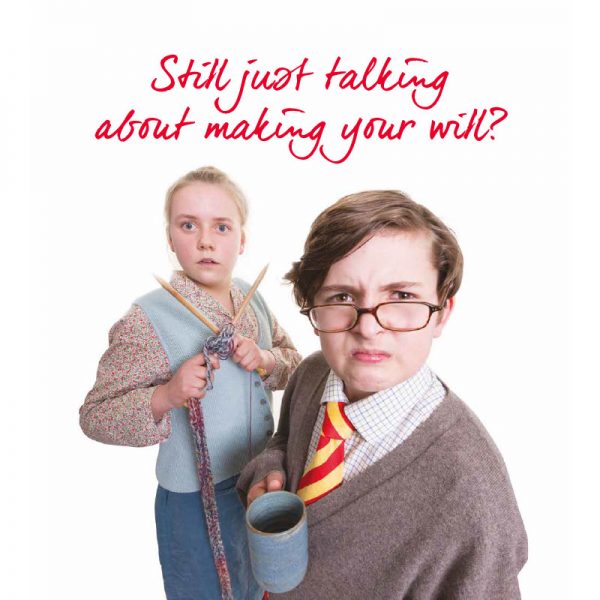Creating a Will
If you have specific wishes for your estate upon death, creating a will and keeping it updated ensures that your wishes are respected and executed in a tax-efficient way. Please continue reading for more information on the considerations when making a will.
What Happens if You Don’t Create a Will?
Having a will is important. If you don’t create a will, you are considered intestate and your estate will not necessarily be distributed in the way you intended it to be. For example, if you don’t create a will and are not married nor in a civil partnership, your partner will not inherit your estate. This could create serious financial difficulties for your partner, especially if you share a home with your partner and your family becomes entitled to it.
By not creating a will, you will also lose out on possible inheritance tax relief and exemptions if the worth of your assets exceeds the inheritance tax threshold.
Do You Need a Solicitor to Make a Will?
You can choose to create your own will, but a small mistake or ambiguous wording can have a serious implication for your family and loved ones after your death. These errors can quickly add up in terms of additional legal fees or tax, and lead to disputes, all of which will reduce the assets in your estate. Instructing a solicitor to draft a will is, therefore, a relatively inexpensive exercise compared to the value of your estate.
Common errors when creating a will include, but are not limited to, the following.
- Having the will witnessed by a beneficiary.
- Forgetting to include a particular asset within the estate.
- Being unprepared for the possibility of an executor or beneficiary dying before the testator.
- Not having alterations signed and witnessed, leading to invalidity.
- Failing to take into account the effect of marriage, divorce or civil partnership.
We would always recommend consulting a solicitor when creating a will, especially if:
- you share a property with someone to whom you are not married nor joined in a civil partnership;
- you are a carer of a dependent who cannot care for themselves;
- you have been divorced or have children from more than one relationship; or
- you reside outside of the UK or own a property abroad.
Considerations When Making a Will
There are many factors to consider when creating a will:
1. Your Assets
To avoid the common mistake of forgetting to include a particular asset, it may help to make a list of:
- Your own assets.
- Joint assets.
- Assets in your spouse or partner’s sole name.
On this list, assign each asset to whom you wish to inherit them with as much detail as possible.
2. Dependent Children
If at the time of creating a will, you have children under the age of 18, you will need to consider appointing a guardian in the will. There are several steps to bear in mind:
- Discussion with your spouse or partner regarding your choice of guardian prior to appointing them.
- Discussion with the guardian you wish to appoint.
- Outlining provisions for dependents who are not your children, such as step-children or children from a partner’s previous relationship.
- Deciding and stating the age at which your children should inherit your assets. Under intestacy laws, children inherit at the age of 18, but you may delay this in your will if you wish to choose an age that you deem more appropriate.
3. Executors
An executor is responsible for carrying out the wishes stated in your will and distributing your estate accordingly. Your choice of executor is a very personal consideration when making a will and can help provide peace of mind. Typically, two executors are appointed and may include a family member or friend as well as a solicitor. The benefits of choosing a family member or a trusted friend are that they understand your personal wishes and your legacy, while choosing a solicitor means the legal aspects are taken care of by someone who understands the system.
Although creating a will can be a detailed and sometimes emotional process, a solicitor can assist you by explaining the procedure, discussing your aims and assisting with the best course of action for drawing up a valid will.
4. Beneficiaries and sharing the estate
An important consideration when making a will is who you would like the beneficiaries to be and how you would like to divide your estate among them. For example, if you have two children, you might be likely to leave them each an equal share. However, if one of your children has a high-paying career and the other is unable to work due to disability, you might leave a great amount to the latter child to provide for them.
5. Potential claims against your estate
You should try to be aware of any potential claims against your estate. If you know that there is someone you have not named as your beneficiary who might attempt to sue for a part of your estate, you can make provisions to avoid it.
For financial assets, if you would like to give different amounts to family members, you can outline your reasons in a Letter of Wishes which is a helpful method for avoiding potential disagreements or challenges to the will in the future.
A notable case in 2017 was Ilott vs The Blue Cross and Others, in which a testator left her estate to charity and her daughter, estranged for 26 years, appealed that she had not been left reasonable provisions. The daughter was awarded £50,000, in spite of the estrangement and her mother’s wishes.
6. Inheritance tax
If you have to pay inheritance tax on your estate, there are steps you can take to avoid your beneficiaries paying unnecessarily or paying more than they need to for your inherited estate. Inheritance tax can be complicated, and talking to a solicitor is the best way to protect your assets for your beneficiaries.
7. Expect the unexpected
There is always the possibility that a beneficiary could pass away before the will is needed. Therefore, one consideration when making a will is whether you would like to include a stipulation regarding who receives that beneficiary’s inheritance if they cannot.
8. Witnessing/Signing the Will
For a will to be valid, it must be signed by two people who are not beneficiaries or their spouse or civil partner. They watch you sign it and then sign it in front of you. The most important factor is that the witness has no personal interest in the will.
The witness should refuse to witness the will if:
- The person signing is not the testator;
- They don’t believe the testator can make a free choice (such as if they have reduced mental capacity or if they are being coerced); or
- They are a beneficiary, or spouse or civil partner of a beneficiary.
9. Storing the Will
Wherever you choose to store your will, it must be secure and accessible after your death. Your executor must know where the will is and have access to it. You can keep the will safe yourself if you choose, but many people prefer to entrust it to a solicitor, bank or will storage company.
10. Living Wills
Living wills are legal documents that refer to your medical rights, particularly if you may one day find yourself in a position of not being able to advocate for what you want. This might mean anything from refusing antibiotics to refusing life-saving treatment.
If you choose to make a living will, it’s wise to discuss it with your GP for medical advice and with your family and loved ones so that your decisions don’t come as a shock.
What happens if you don’t make a will? Elizabeth Whitaker discusses:
Our wills, probate and trusts team is here to help.
Please call us to find out how we can help. We can talk on the phone or arrange a meeting where we can discuss your options and give you a clear idea of timeframes and costs.
Alternatively, please contact us online and we’ll call you back when it’s convenient for you.







